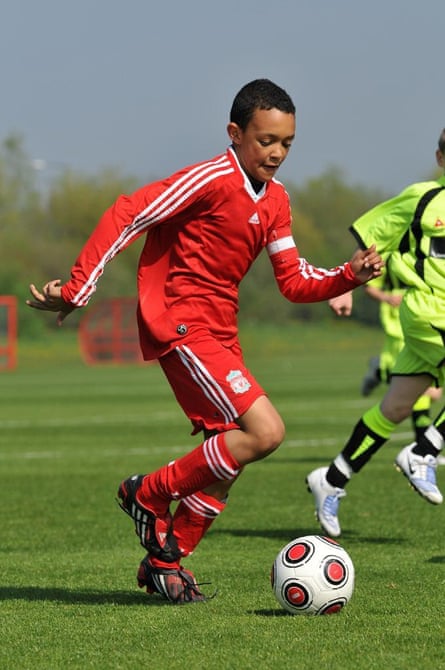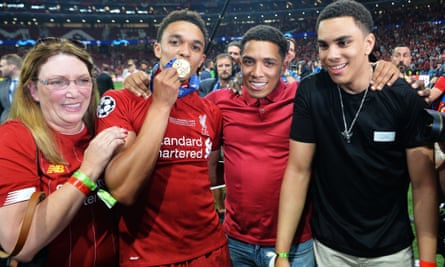Trent Alexander-Arnold wants to make clear he has absolutely no regrets about his path to the Premier League. He’s about to recount memories of extreme pressure and major sacrifice. And, really, he’s not complaining. “I’m a success story,” he says, in a soft scouse accent, not boastful. “I look back and I’m proud. I got here through hard work and discipline.” At 24, he has already banked a lifetime of financial and vocational achievements. But he is a rare exception. And for the past few years, that fact has been troubling him.
Like the vast majority of top-flight professional players in the UK and beyond, Alexander-Arnold came up through a football academy. Across the country, around 12,000 boys aged eight and up are enrolled in these training schemes (boys and girls can start training with clubs from as young as five years old). Professional clubs scout young players and help them develop towards the adult game. Around 3,500 boys are currently signed to Premier League academies, but over 99% of children signed to an academy aged nine won’t have a professional footballing career. “There were players who were faster and stronger than me who didn’t make it,” Alexander-Arnold tells. “I’m not moaning about it. I’m not saying I don’t deserve it. But I played with hundreds of kids growing up. Against thousands. What would have happened if it hadn’t worked out for me?”
In February last year, Alexander-Arnold uploaded a video to Instagram asking others who’d been through academies with less success to share their stories. “I wanted to educate myself,” he says, “and to know what happened: where did they go? Who could they turn to? Were clubs helpful? And, most importantly, what did they need that wasn’t there?” The replies piled up in their thousands. Boys and men of all ages talked of mental health struggles, of shame, of losing all sense of identity. “The main problem was: what do I do now? Many didn’t have the qualifications to go back to education, or felt too old to.”

So he got to work on a solution. This week, Alexander-Arnold launches a new initiative, the After Academy, which he’s hoping will grow into a much-needed space to support let-go young players. Initially, the programme will focus on education and career prospects. Partners already include Liverpool FC, Therabody, Red Bull and Under Armour, who’ll be offering internships, placements and full-time work to ex-academy players (Alexander-Arnold requested all his sponsors participate in the project). In time, he hopes the initiative will grow in other ways. “Whatever somebody needs at that difficult time I want to facilitate,” he says. “Whether it’s education, work, or just someone to talk to who understands why you’re struggling. All I want to do is help, for people to know there’s no shame in asking.”
We meet on a rare midweek day off for the Liverpool player, in the plush living room of his grand, gated Cheshire home. He bought the house aged 20 and lives here with his mum, Dianne. Statistically speaking, Alexander-Arnold is yet to reach his professional prime, but already he’s been touted as one of the global game’s greatest full-backs. In recent weeks, after a period of sustained criticism, he’s been moved into Liverpool’s midfield, with positive results. Behind him is a framed photograph: he and his two brothers (the older, Tyler, now his manager) proudly wielding the European Cup in 2019, a night when Trent helped Liverpool to Champions League victory. This season has been trickier. Despite a more recent return to form, much of it has been disappointing.
“As a player there’s nothing like lifting a trophy for your club and seeing what it means to the fans,” he says, glancing towards the picture. “So to go through a period where we’re not performing as well as we could is difficult.” He’s certain the team can and will return to winning ways. “It’s what our fans deserve. But you learn a lot about yourself – as a player and as a person – going through the challenges of a season like this one. If you can come through the other side of it without becoming demotivated, my hope is it makes you a better footballer.” His preparation for the highs and lows of professional football started young. Of academies, he says, “Resilience is definitely also something you learn coming up there. So when I got into the first team, nothing surprised or shocked me. I’m used to being critiqued, told what needs to be improved, what not to do. Always having people lay their opinion on me helped me build a coat of armour.” It could have gone the other way. “Huge crowds, social media, pundits giving their opinion of you – not all of it good – might have broken me this year. But it has made me stronger.”
Alexander-Arnold has been thinking of his time at the academy a lot over the past 18 months. Not so much his own efforts, but those of his contemporaries, the young players who he trained with, but never made it to the big leagues. “I’m one of the lucky ones,” he says. “You only see those people. All the lads I grew up with, though? We all put in the same amount of effort. Made the same sacrifices. But not a single one of them ever got the chance to kick a professional football.” In late 2020, he read about Jeremy Wisten, 18, a former Manchester City academy player who took his own life after being released. “Of course, I already knew there was a problem. I saw it. But I never imagined someone would take their life. I’m not justifying it. Only, the more I thought about it, the more I could almost understand how it happened.

“I know how much you put into football in the academy system: it’s your whole life,” he goes on. “Most people don’t understand what you have to do to even give yourself half a percent of a chance of making it. I kept thinking about that Man City lad.”
Alexander-Arnold made his professional debut for Liverpool at 18, but “it got me thinking about the rest of my age group who didn’t make it. I was the only one who did. I kept thinking about how they were coping, how they were getting on. If it never worked out for me, would I look back with regrets for making all those sacrifices? Yes, probably.”
Alexander-Arnold grew up in West Derby, a Liverpool suburb. Anfield Stadium was a 10-minute drive away. Melwood, the club’s then training ground, was less than a mile down the road. His mother looked after Alexander-Arnold and his brothers while his father worked in London. In Year 2, someone from Liverpool FC popped into his primary school to recruit for a half-term holiday training camp run by the club for local children. “My teacher asked who wanted to go,” he says, “and everyone put their hand up. The only fair way was to pick names out of a hat.” Trent’s came out.
“Before that I’d not played structured football before,” he says, “only with my brothers smashing lamps at home, and in the playground.” Within 15 minutes of the training camp, a coach asked his mum to bring him along to regular games and training. “Liverpool won the Champions League that year [2005],” he says. “The victory parade passed by our front door. I saw what the game did to people. The joy it brought. I remember thinking: that needs to be me one day. It’s when I fell in love with football.”
From the age of seven, he was training Tuesdays and Thursdays after school, and playing matches on Sunday. He signed his first contract with the club at eight, and bumped up to three evening sessions. “It’s at that stage things started to get serious,” he says. “You sign a contract and you’re the club’s for the year.” From then on, it’s a fight to keep your place, year on year. “Even though I was really young,” he says, “from then on a career in football felt possible. Rather than saying it while kicking a ball about with mates or watching Match of the Day, I was in the system. My parents never rammed football down my throat, saying this was our golden ticket to change our lives. I didn’t have a parent living their dream through me either. But that happens a lot. I saw it.”
Through his teenage years, the scale of sacrifice grew. At 10, he’d been taken out of school PE classes to avoid injuries. From 12, he trained every night of the school week, and had fixtures at the weekend. “Football wasn’t a hobby for me from secondary school on,” he says. “There was never time to hang out with mates. We were never in a position to have family holidays, but even if we were, that was never going to be possible.” School term times didn’t align with the football season. When he was 12, Liverpool requested he start training during school hours as well – two afternoons a week, on top of the already relentless schedule. His private Catholic school in Crosby weren’t game. His family weren’t sure either. Liverpool suggested he transfer to Rainhill, a local state secondary that had a specific stream setup to support the academy boys.

There were 16 boys in Trent’s academy age group. A van would pick them up at 7am. He’d be dropped home just after 8pm for homework, dinner and sleep, exhausted. “That was my life for four years,” he says. “It’s all I did. Never once deviating from it. I spent a little bit of time with Mum and my brothers, but nothing of any substance.” It was tough. “I definitely disconnected from my family at that point. I just didn’t see them. I was up before anyone to go to school and would get home late, totally knackered.” Typical teenage experiences were nonexistent. “I never once went to a house party,” he says, “or hung out after school at the shops, or walked home with mates from school.” Those formative rites of passage? “I never experienced any of it.”
To free training time up in his later school years, exams were taken early. Science and maths GCSEs were sat in Year 9 and Year 10 so he’d be available for training as the adult game edged closer. He sat a maths exam in Bulgaria, midway through an under-17 competition. “Obviously, I don’t think I’ve done less revision for anything in my life,” he says. “Surely that can’t be normal. Sacrifices like that shouldn’t be happening. A pass was considered good enough,” he adds. “I was brought up to aim for Bs, minimum, for the other lads it was just getting passes so they could drop their subjects and free up time. Then in Year 11, the big year of secondary school, it all got chopped.” Monday was his only full day in class. Plus, two mornings and one afternoon. It added up to barely half a school week. “I missed a lot of lessons. In theory, I was following a normal school timetable and I didn’t have lessons scheduled on top, so I was having to try to make it up on my own.” In the end, he secured two Bs and six Cs at GCSE. Alexander-Arnold will never need exam results on his CV, but plenty of his youth teammates don’t have that luxury. Of the 15 boys he trained with, he’s the only one now playing professionally.

It’s a world away from most childhoods. Does he ever think about the hit his youth took because of it? “Of course. I look back and I’m happy and proud I did it. But if I didn’t make it, would I look back and regret having done it – 100%. What would have been the point? It’s not fair, really. That’s how I feel. Taking everything away from you with nothing at the end to show for it. I know how hard it is. Losing contact with all your friends. Sacrificing a lot of your school work. Disconnecting from family. And what’s the point if you’ve got nothing to show for it?”
Being dropped by an academy at any age is rough. A 10-year-old being told their childhood dream won’t come true is a painful, transformative moment. “It’s hard, but that’s the system, the way it has to work. There’s not much you can do about it.” Better that than dragging out the inevitable. “At 10 you’ve got enough time to make it up and have success elsewhere. But when you’re 16 and you’ve sacrificed everything, then you’re told you’re not being kept on? That’s when what you’re meant to do is unclear. You’ve given the club these five years of your life. You can’t just go back and relive your teenage years.”
From 16 to 18, the players with the strongest prospects are taken on by academies full-time, paid a small wage as scholars or apprentices. “We did a sports BTec once a week,” he says of that time. “But you did it to tick the boxes. It wasn’t proper. We were focused on football.” The first team starts to feel within touching distance. “People watch your youth games on TV, your name floats around. You start to feel more like a footballer. You really do start to believe you’re close. You hear stories of 16 and 17-year-olds playing first-team football. It’s within reach. You feel so close to being able to provide for your family. But at that age, it’s very deceiving.” In reality, five out of six of these players will have been released or dropped by 21, according to the Professional Footballers’ Association (PFA). “But to keep going, you have to believe you’re the one who’ll make it.” The older you get, the bigger that fall feels: a lifetime’s work unrewarded.

Presumably, coaches know ahead of time who has professional potential. Are some boys strung along to make up numbers, well into their late teens? “Definitely,” he replies, “100% – that happens from a very young age. You have to make a team with enough players. The later that goes on, the worse it gets… players are sometimes kept on for that one person in a group to train with.” Could guilt be driving him? He thinks carefully. “I don’t think so, no,” he replies. “But I am caught at a crossroads. One part of me thinks there’s too much sacrifice. That’s it’s too intense from such a young age, and so much pressure. While it might seem necessary, it’s potentially unfair and damaging. At the same time, I know from my experience that’s what’s needed. You have to do that to have a half a chance. It’s why I think the solution maybe isn’t in that, but what happens after the academy system.”
Enter the After Academy. In conjunction with the PFA, its primary focus will be supporting ex-academy players from all clubs into sports-related careers. The project will identify and partner with employers to create jobs that acknowledge and make use of the transferable skills academies equip you with. The hope is to offer a route to an alternative, attractive future for young men at a time when they might otherwise feel helpless. “Even within football,” Alexander-Arnold says, “there are so many other jobs off the pitch that I didn’t know about when I was younger. It was only when I got to the first team that I saw there was this whole club with so many other roles and options. It’s about identifying those, and making new opportunities for the lads as well. I’m still working out exactly what we need to do. We won’t solve it overnight. But where do we need to be to help? That’s the question.”
This is the first phase of a major undertaking by Alexander-Arnold. He isn’t just attaching his name to a campaign, or throwing cash at a cause. He sees it as a responsibility. “I know how close I came to all of this not happening for me,” he says. “I tell my story and people react saying, ‘Wow, it’s so special, blahblahblah.’ But there were 16 of us on the same journey in my year. And I’m the only name you know. The rest just got forgotten. I feel I have a duty to make sure these lads are heard and supported. It could have so easily been me.”
Men’s fashion editor Helen Seamons; photographer’s assistant Tom Frimley; digital technician Claudia Gschwend; fashion assistant Roz Donoghue
